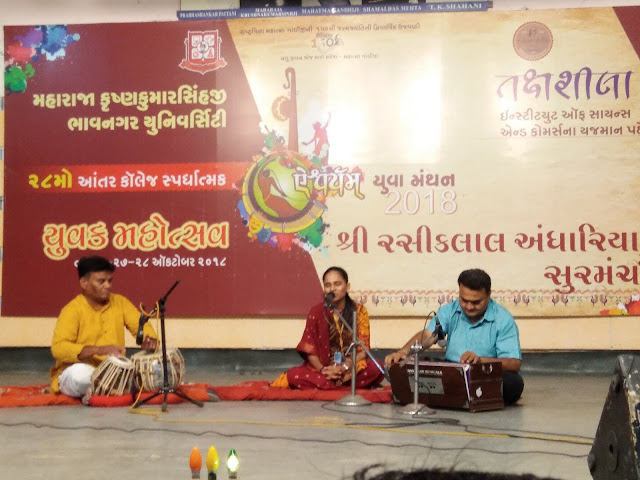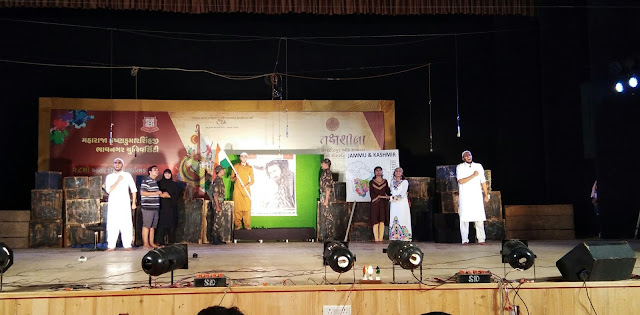‘Art is not what we see, but what we make others to see’ and Youth festival is such a platform where youngster can get chance to present themselves. And Maharajakrishn Kumar Sinhji University of Bhavnagar organized three days beautiful ‘Aeshwaryam’ youth festival. Aeshwaryam name itself suggests the beauty and joy art in life. Takshashila college of Bhavnagar hosts the three days festival very well. Under this festival various competition took place. As my Teacher told to watch every event with consciousness of learning, and here try to reflect this process of learning or thinking while watching. I try to attend many event and got something new about art.
1.On the( 26-10-18)first day, Firstly I attended સ્વરચિત કાવ્યપઠન which was at Shri Krushnlal Shridharinj SahityManch at Gujrati Department MKBU. Anchored by Himal Pandya Sir and then by Harish Mahuvakavar sir. There were many participants and they write and recite also well. Subject of their poems was…
• Significance of friendship
• Welcome Diwali
• Story of pen
• Na vrsela vrsad nu git
• Vany Kanya na Sanvedno
• Jivan Anjali thajo
Common theme in many poems was about Significance of Friendship and as Judge Firdoz Dekhaiya told that it’s all about immature poems and real beauty is in this. Here I’m putting some photographs of poems of that day
Judges and Anchour of the event
2.Second, Competition I have attended was Sugam Git and there were many participent who sung beautiful song . Basically Songs in Gujrati language and songs and ghazals of Ramesh Parekh and Mahamnad Daikheya were most popular.
3.Third competition I have attended was Lok Nutrya and it was amazing. Gujrati Falk Dance ‘Garba’ is popular all among the world and Bhavnagaris whose known as Kalapremi, they are very well in Garba and I feel that on many performance of that day.
2nd day
4. I have participated in Essay Writing competition. There were six on the spot given topic..
1.Imprtance of Democracy
2. Importance of Media
3.Media: regressive or progressive?
4. Terrorism an unsolved question
And two others… I have done good and try to write on Democracy. I justify my views with the help of examples of Mahabharata to current scenario.
5.One act play
'Act is not what you see, but what you make others to see.'
This is very exiting and interesting competition at Kiritsinhji Gohil Natymanch in Atal Auditorium MKBU. I have watched four one act play there.
1.sikkani triji baju
This one act play deal with very sensitive topic of Third Gender in our society. What about their existence and how difficult for them to survive in this rigid sciety.
2.Muje fakr hai
This play deal with Nationalism or patriotism. How terrorism rise in one’s mind and increase problems in society. Question of Jammu was presented with the main plot. There is great debate in Should I follow terrorism or Should I Follow path of virtue and peace. That we can connect with good angel and bad angel of Christopher Marlow’s play Doctor Faustus. In the play famous dialogue repeated that…’Confusion hai’ and at last that confusion removed and triumph of peace resulted into two happy family.
3 Papan vchche dariyo
This play’s used flashback technique in narration and there were many violence and revenge. Play was all about one family of sea voyagers and their son Arjan with his boat Kuber. What I find as major theme in this is Revenge, Love for sea, Violence, love, marriage, hope.
6.Orchestra
Sixth competition which was at Main stage ‘Kala guru Dharmashibhai Shah Manch’ at amphi theatre. In this event I want to write just one line is that I got Aesthetic delight, I forget all worries and completely I was feeling the music only.
7.Duha chand
It was also an interesting event. In this I come to know about Ghanshyam bhai kavi a great gujrati Falk singer, another one is Dhardip Sinh an amazing singer of Duha and chhand.
3rd day
Paintings, Rangoli, collage, poster making, clay modeling and Installation; ending session afternoon.
All this art of peace majorly connected with contemporary issuee happens in society like #MeToo movement, use of media, harm and benifit of wts app, facebook and otthers application.
1.On the( 26-10-18)first day, Firstly I attended સ્વરચિત કાવ્યપઠન which was at Shri Krushnlal Shridharinj SahityManch at Gujrati Department MKBU. Anchored by Himal Pandya Sir and then by Harish Mahuvakavar sir. There were many participants and they write and recite also well. Subject of their poems was…
• Significance of friendship
• Welcome Diwali
• Story of pen
• Na vrsela vrsad nu git
• Vany Kanya na Sanvedno
• Jivan Anjali thajo
Common theme in many poems was about Significance of Friendship and as Judge Firdoz Dekhaiya told that it’s all about immature poems and real beauty is in this. Here I’m putting some photographs of poems of that day
Judges and Anchour of the event
2.Second, Competition I have attended was Sugam Git and there were many participent who sung beautiful song . Basically Songs in Gujrati language and songs and ghazals of Ramesh Parekh and Mahamnad Daikheya were most popular.
3.Third competition I have attended was Lok Nutrya and it was amazing. Gujrati Falk Dance ‘Garba’ is popular all among the world and Bhavnagaris whose known as Kalapremi, they are very well in Garba and I feel that on many performance of that day.
2nd day
4. I have participated in Essay Writing competition. There were six on the spot given topic..
1.Imprtance of Democracy
2. Importance of Media
3.Media: regressive or progressive?
4. Terrorism an unsolved question
And two others… I have done good and try to write on Democracy. I justify my views with the help of examples of Mahabharata to current scenario.
5.One act play
'Act is not what you see, but what you make others to see.'
This is very exiting and interesting competition at Kiritsinhji Gohil Natymanch in Atal Auditorium MKBU. I have watched four one act play there.
1.sikkani triji baju
This one act play deal with very sensitive topic of Third Gender in our society. What about their existence and how difficult for them to survive in this rigid sciety.
2.Muje fakr hai
This play deal with Nationalism or patriotism. How terrorism rise in one’s mind and increase problems in society. Question of Jammu was presented with the main plot. There is great debate in Should I follow terrorism or Should I Follow path of virtue and peace. That we can connect with good angel and bad angel of Christopher Marlow’s play Doctor Faustus. In the play famous dialogue repeated that…’Confusion hai’ and at last that confusion removed and triumph of peace resulted into two happy family.
3 Papan vchche dariyo
This play’s used flashback technique in narration and there were many violence and revenge. Play was all about one family of sea voyagers and their son Arjan with his boat Kuber. What I find as major theme in this is Revenge, Love for sea, Violence, love, marriage, hope.
6.Orchestra
Sixth competition which was at Main stage ‘Kala guru Dharmashibhai Shah Manch’ at amphi theatre. In this event I want to write just one line is that I got Aesthetic delight, I forget all worries and completely I was feeling the music only.
7.Duha chand
It was also an interesting event. In this I come to know about Ghanshyam bhai kavi a great gujrati Falk singer, another one is Dhardip Sinh an amazing singer of Duha and chhand.
3rd day
Paintings, Rangoli, collage, poster making, clay modeling and Installation; ending session afternoon.
All this art of peace majorly connected with contemporary issuee happens in society like #MeToo movement, use of media, harm and benifit of wts app, facebook and otthers application.
Rangoli
Oil Painting
Clay Modeling
This was an amazing compitition. I found this is very tuff to creat model from clay and give a beautiful shape it's not an every one's cup of tea!
Poster making
Installation is the new added compitition from last year and world wide famous compitition for best creative outcomes. In this youth festival there were also few creative installation. Which was connected with theme of 'Swatch Bharat Swasth Bharat' means on Cleanliness and 'SarvDharm Sambhav'.
Cartooning is another interesting compitition where we can see the creativity through colors. Cartoons were connected with current affairs like #MeToo movements and politics.
At last, There were prize distribution ceremony. In this our department also won prizes in compitiin like western group and solo song, rangoli etc., Group Photograph of youth festival team of Department of English MKBU.





































